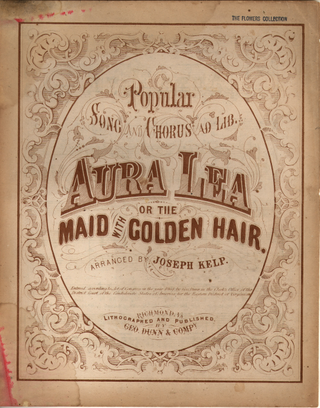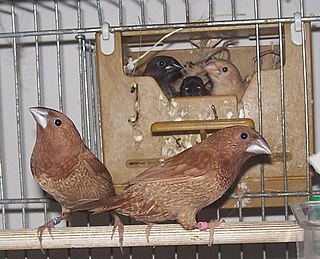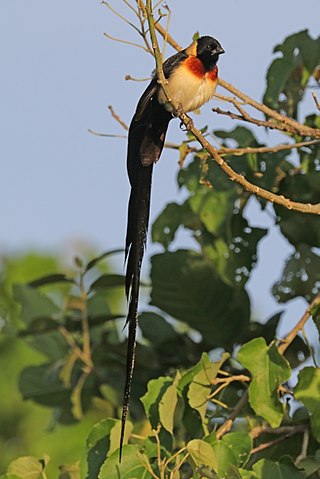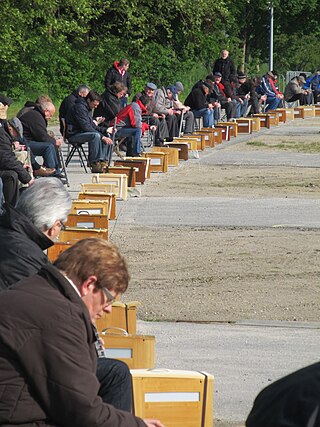
The word thou is a second-person singular pronoun in English. It is now largely archaic, having been replaced in most contexts by the word you, although it remains in use in parts of Northern England and in Scots. Thou is the nominative form; the oblique/objective form is thee ; the possessive is thy (adjective) or thine ; and the reflexive is thyself. When thou is the grammatical subject of a finite verb in the indicative mood, the verb form typically ends in -(e)st, but in some cases just -t.

The common chaffinch or simply the chaffinch is a common and widespread small passerine bird in the finch family. The male is brightly coloured with a blue-grey cap and rust-red underparts. The female is more subdued in colouring, but both sexes have two contrasting white wing bars and white sides to the tail. The male bird has a strong voice and sings from exposed perches to attract a mate.

The Tenerife blue chaffinch is a species of passerine bird in the finch family Fringillidae. It is endemic to Tenerife in Spain's Canary Islands. This bird is the natural symbol of this island, together with the Canary Islands dragon tree.

The common linnet is a small passerine bird of the finch family, Fringillidae. It derives its common name and the scientific name, Linaria, from its fondness for hemp seeds and flax seeds—flax being the English name of the plant from which linen is made.

Bird vocalization includes both bird calls and bird songs. In non-technical use, bird songs are the bird sounds that are melodious to the human ear. In ornithology and birding, songs are distinguished by function from calls.
The music of Belgium is a cultural mix where Flemish Dutch-speaking and Walloon French-speaking traditions mix with those of German minorities and of immigrant communities from Democratic Republic of the Congo or other distant countries.

The Flemish Region, usually simply referred to as Flanders is one of the three regions of Belgium—alongside the Walloon Region and the Brussels-Capital Region. Covering the northern portion of the country, the Flemish Region is primarily Dutch-speaking. With an area of 13,522 km2 (5,221 sq mi), it accounts for only 45% of Belgium's territory, but 57% of its population. It is one of the most densely populated regions of Europe with around 490/km2 (1,300/sq mi).

The red siskin is a small endangered finch.

"Aura Lea" is an American Civil War song about a maiden. It was written by W. W. Fosdick (lyrics) and George R. Poulton (music). The melody was used in Elvis Presley's 1956 hit song "Love Me Tender".

Known as the Society finch in North America and the Bengali finch or Bengalese finch elsewhere, Lonchura striata domestica is a domesticated finch not found in nature. It became a popular cage and trade bird after appearing in European zoos in the 1860s where it was imported from Japan. There have been many theories of the origin of domestication for the Bengalese finch, and we now know it took place primarily in Japan. Coloration and behavior were modified through centuries of selection in Asia, then later in Europe and North America.

Animal song is not a well-defined term in scientific literature, and the use of the more broadly defined term vocalizations is in more common use. Song generally consists of several successive vocal sounds incorporating multiple syllables. Some sources distinguish between simpler vocalizations, termed “calls”, reserving the term “song” for more complex productions. Song-like productions have been identified in several groups of animals, including cetaceans, avians (birds), anurans (frogs), and humans. Social transmission of song has been found in groups including birds and cetaceans.

Belgium competed in every Junior Eurovision Song Contest before withdrawing 2013. The country's best result was in 2009, when Laura Omloop came 4th with "Zo verliefd". Belgium's worst result was in 2007, with Trust coming 15th with "Anders".

The long-tailed paradise whydah or eastern paradise whydah is from the family Viduidae of the order Passeriformes. They are small passerines with short, stubby bills found across Sub-Saharan Africa. They are mostly granivorous and feed on seeds that have ripen and fall on the ground. The ability to distinguish between males and females is quite difficult unless it is breeding season. During this time, the males molt into breeding plumage where they have one distinctive feature which is their long tail. It can grow up to three times longer than its own body or even more. Usually, the whydahs look like ordinary sparrows with short tails during the non-breeding season. In addition, hybridization can occur with these paradise whydahs. Males are able to mimic songs where females can use that to discover their mate. However, there are some cases where females don't use songs to choose their mate but they use either male characteristics like plumages or they can have a shortage of options with song mimicry. Paradise whydahs are brood parasites. They won't destroy the eggs that are originally there but will lay their own eggs in other songbirds nest. Overall, these whydahs are considered least concerned based on the IUCN Red List of threatened species.

The British finches are made up of several species of finch which were formerly very popular as cage birds in Great Britain. They are not currently commonplace, but are still kept by a few dedicated fanciers.

A birdcage is a cage designed to house birds as pets.

The Kingdom of Belgium has three official languages: Dutch (Flemish), French, and German.

The orange weaver is a species of bird in the weaver family, Ploceidae. It is sparsely distributed across African tropical rainforest.
"The Blinded Bird" is a 1916 poem written by English author and poet Thomas Hardy.

The Voliere Zürich is an aviary and veterinary hospital situated in the Arboretum in the Swiss city of Zürich. It also houses the so-called Vogelpflegestation, a unique sanatory for birds.

A bird singing contest is a competition or hobbyists' get-together of singing bird family, including the long-crowing cock, wild species usually kept in cages. Such contests and meetings are held in at least 22 countries of the world, and at least 36 different species are used in this way.


















